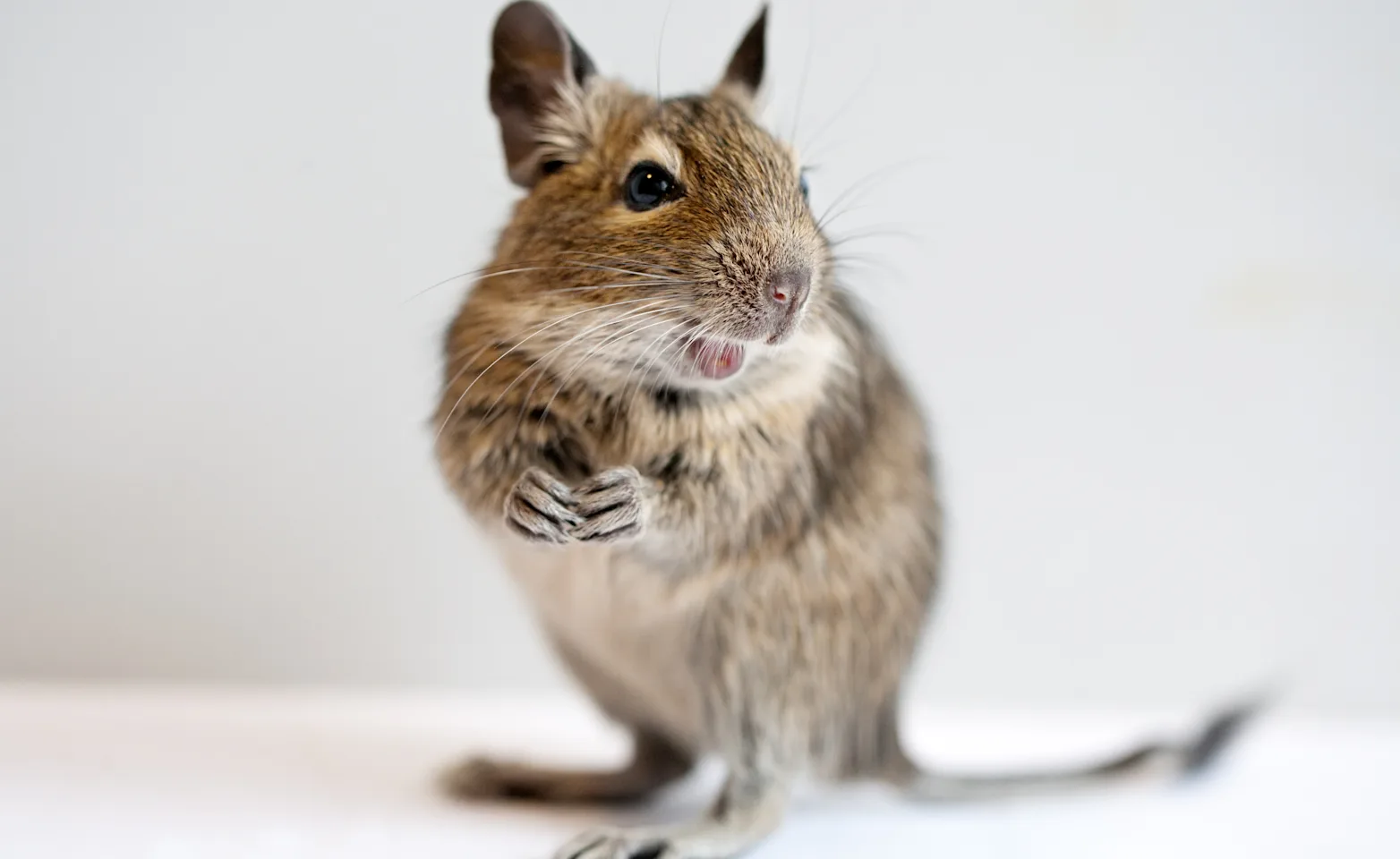Warren Woods Veterinary Hospital

Degus are a relative of the guinea pig and chinchilla and originate from the Andes Mountains of Peru and Chile. Degus are diurnal meaning they are most active during the daytime. They reach an average length of 5-7 inches and can live to be 5-8 years old.
Degus are very social creatures and prefer to live in large communities in a complex system of burrows. Without social interaction and exercise they can become neurotic and aggressive. You will hear different loud pitched noises from your degu this is how they communicate with one another. Degus also will make different noises to express their moods. A happy degu will make high pitched squeaks at a fast rate, while an unhappy or scared degu will make a chattering noise. Degus reach sexual maturity at approximately 6 weeks of age so it is recommended to keep degus with others of the same sex to prevent unwanted breeding.
Degus can be docile pets if socialized and handled from a young age. It is important to not startle your degu when picking them up. Always use two hands and scoop them up from underneath. Never pick up a degu from the tail, they may shed the skin on their tails and sometimes their whole tails as a defense mechanism.
A large enclosure is very important for your Degus to get the proper exercise. It should be minimally 36 inches by 24 inches by 24 inches tall but the larger the better. The cage should be wire to allow better ventilation and have a solid bottom to avoid sores on the feet. A multilevel cage for ferrets is ideal. The bedding on the bottom of the cage should be made of a recycled paper product or shredded newspapers. Litters made of wood shaving may be irritating to their mucus membranes, skin and respiratory tract. Wood shavings may also be contaminated with pesticides or parasites. A hide house should also be provided, this can be purchased from your local pet store and will provide a place for your degu to sleep and hide in.
Degus are very active and adamant chewers so it is important to provide them with toys to chew. These can be purchased at your local pet store and may include wood blocks, apple wood, pear wood, willow balls, rabbit or large parrot toys; just avoid plastic toys. A degu’s teeth are constantly growing, however, the natural alignment of their teeth when chewing and grinding keeps them at a proper, healthy length.
Like their chinchilla relatives, the degu requires a dust bath to keep clean. This pumice or fine ground volcanic rock dust can be purchased at your local pet store along with a dust bath house. Your degu should be offered a dust bath every few days, the dust absorbs oil and dirt. They will love to roll around and jump in the dust, just stand back because they may make a dusty mess.
Your degu can learn to drink from a water bottle or large ceramic dish. Food should be offered in a ceramic dish; plastic dishes are easily chewed and destroyed. The cage and dishes should be cleaned and rinsed thoroughly at least weekly with a mild soap.
The best diet for your degu is a high-quality hay based pellet and a never-ending supply of hay. Alfalfa is good for young (under one year of age) or nursing degus. Adults need a more timothy hay based diet as alfalfa has too much protein for adults. Other grassy hays may be offered as well, but timothy should be the most abundant. Additional hays may include orchard, oat or botanical hays. Always make sure the hay is fresh, dry, and free of mildew and mold. Degus should not be fed fruit or sugary food; they do not produce the insulin that is needed to store the sugar so they can easily become diabetic. Some vegetables may be offered in moderation, broccoli, leafy greens and green beans are recommended. Fresh food should be removed from the cage if not eaten within a few hours to prevent rotting. Avoid sudden or drastic changes to the diet as this may lead to diarrhea.
If you suspect your degu is sick you should seek veterinary help immediately. Common health issues that affect the degu include diabetes, fatty liver, cataracts, dental disease and parasites. A degu should see a qualified exotic veterinarian at least once a year for a wellness exam or more often if they suffer from any of the previously mentioned ailments.
